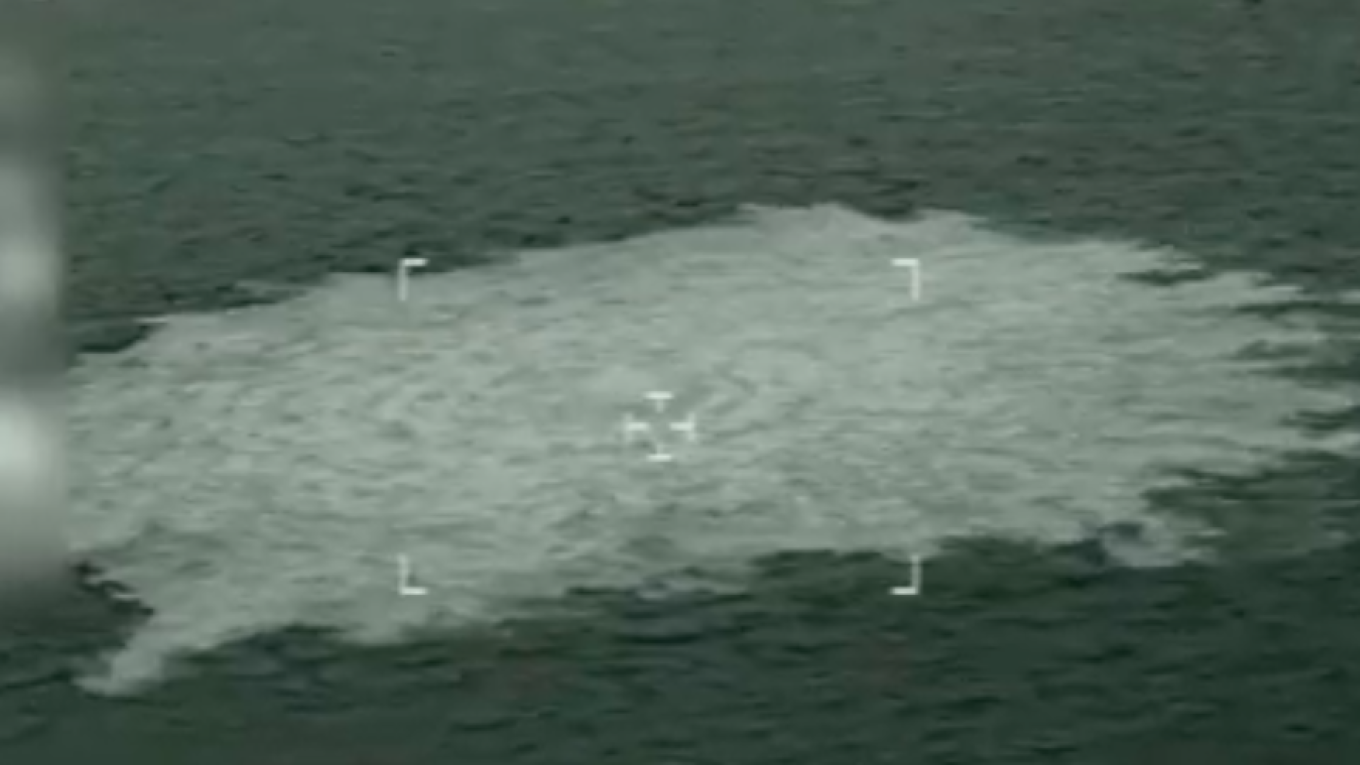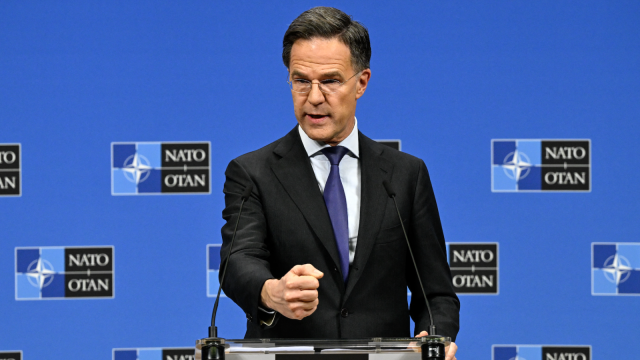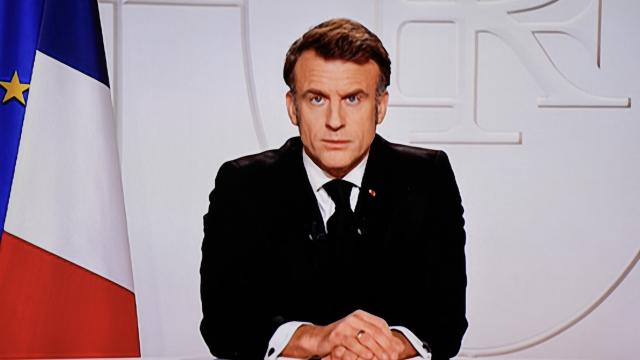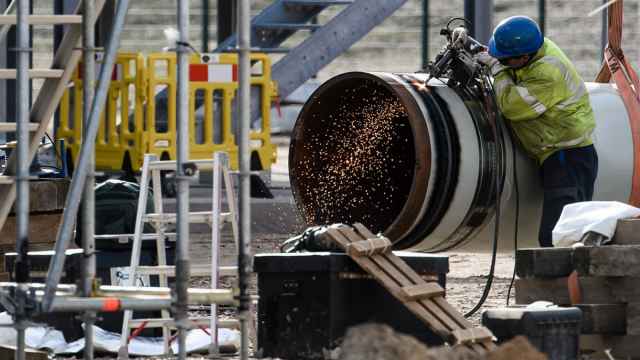Sabotage is the most likely cause of leaks in two Baltic Sea gas pipelines between Russia and Europe, European leaders said Tuesday, after seismologists reported explosions around the Nord Stream pipelines.
EU chief Ursula Von der Leyen said "sabotage" caused the leaks. She threatened the "strongest possible response" to any deliberate disruption of European energy infrastructure.
The Nord Stream 1 and 2 pipelines have been at the center of geopolitical tensions in recent months as Russia cut gas supplies to Europe in suspected retaliation against Western sanctions following its invasion of Ukraine.
Photos taken by the Danish military showed large areas of bubbles on the surface of the water, emanating from the three leaks in Sweden and Denmark's economic zones north of Poland, from 200 to 1,000 meters (656 feet to 0.62 miles) in diameter.
Danish Prime Minister Mette Frederiksen described them as "deliberate acts," saying: "We are not talking about an accident."
Polish Prime Minister Mateusz Morawiecki said the leaks were an act of sabotage that "probably marks the next step of escalation of the situation in Ukraine."
And Sweden's outgoing Prime Minister Magdalena Andersson said "there have been detonations," although foreign minister Ann Linde said they would not "speculate on motives or actors."
The United States was looking at reports that the leaks were "the result of an attack or some kind of sabotage," U.S. Secretary of State Antony Blinken said. National Security Adviser Jake Sullivan said Washington "is supporting efforts to investigate and we will continue our work to safeguard Europe's energy security."
Copenhagen expects the leaks at the pipelines, which are full of gas but not operational, to last "at least a week" — until the methane escaping from the underwater pipes runs out.
Like Denmark, the Swedish government said it does not consider this as an act of aggression against it, given that the events took place outside its territorial waters, in the exclusive economic zones.
Two "massive releases of energy" were recorded by the Swedish National Seismic Network shortly before the gas leaks near their locations off the coast of the Danish island of Bornholm, Uppsala University seismologist Peter Schmidt told AFP.
"With energy releases this big there isn't much else than a blast that could cause it," he added.
Russia said earlier that it was "extremely concerned" about the leaks.
Asked by reporters whether it could be an act of sabotage, Kremlin spokesman Dmitry Peskov said that at the moment "it is impossible to exclude any options."
But Ukraine said it was "nothing more than a terrorist attack planned by Russia and an act of aggression toward the EU."
'Extremely rare'
The pipelines are operated by a consortium majority-owned by Russian gas firm Gazprom.
One of the leaks on Nord Stream 1 occurred in the Danish economic zone and the other in the Swedish economic zone, while the Nord Stream 2 leak was in the Danish economic zone.
A leak was first reported on Nord Stream 2 on Monday.
Two Danish military vessels have been dispatched to the area, while Sweden's government called an emergency meeting on Tuesday.
Neighboring Norway, an oil producer, on Tuesday said it had "heightened emergency preparedness" related to the Norwegian Continental Shelf. "Some of the background are reports of increased drone activity," a government statement said.
Navigational warnings have been issued for a distance of five nautical miles and a flight height of 1,000 meters (3,280 feet) around the Baltic Sea leaks.
"Gas pipeline leaks are extremely rare and we therefore see a reason to increase the level of preparedness following the incidents we have witnessed over the past 24 hours," Danish Energy Agency director Kristoffer Bottzauw said in a statement.
A Nord Stream spokesperson told AFP they had not been able to assess the damage but conceded that "an incident where three pipes experience difficulties at the same time on the same day is not common."
Built in parallel to the Nord Stream 1 pipeline, Nord Stream 2 was intended to double the capacity for Russian gas imports to Germany.
But Berlin blocked newly completed Nord Stream 2 in the days before the war.
Germany, which has been highly dependent on imports of fossil fuels from Russia to meet its energy needs, has since come under acute stress as Moscow's supplies dwindle.
Gazprom progressively reduced the volumes of gas being delivered via Nord Stream 1 until it shut the pipeline completely at the end of August, blaming Western sanctions for the delay of necessary repairs to the pipeline.
Germany has rebuffed Gazprom's technical explanation for the cut, instead accusing Moscow of wielding energy as a weapon over the war in Ukraine.
A Message from The Moscow Times:
Dear readers,
We are facing unprecedented challenges. Russia's Prosecutor General's Office has designated The Moscow Times as an "undesirable" organization, criminalizing our work and putting our staff at risk of prosecution. This follows our earlier unjust labeling as a "foreign agent."
These actions are direct attempts to silence independent journalism in Russia. The authorities claim our work "discredits the decisions of the Russian leadership." We see things differently: we strive to provide accurate, unbiased reporting on Russia.
We, the journalists of The Moscow Times, refuse to be silenced. But to continue our work, we need your help.
Your support, no matter how small, makes a world of difference. If you can, please support us monthly starting from just $2. It's quick to set up, and every contribution makes a significant impact.
By supporting The Moscow Times, you're defending open, independent journalism in the face of repression. Thank you for standing with us.
Remind me later.






